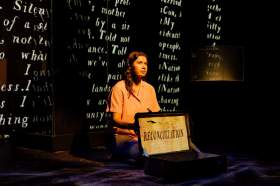‘We know that the vast majority of musicians teach, it’s part of the DNA,’ said Beth Woollacott, CEO of the Australian Guild of Music.
Describing teaching as ‘an essential part of a portfolio career,’ Woollacott told ArtsHub that the real challenge for many musicians is how to improve their teaching skills so that they really thrive in it.
To assist with such a goal, the Australian Guild of Music Education is now offering a Bachelor of Music with Specialisation in Instrumental/Vocal Teaching. This can be done as a single specialisation or alongside Performance or Composition.
Instead of teaching students according to a single methodology, as many practising musicians were taught, Woollacott said the point of music pedagogy is to ‘start exploring how people learn’ and find appropriate methodologies for the student as an individual learner.
‘Only after you’ve engaged with music psychology and pedagogy do you start to explore multiple teaching strategies for your students. This includes child-safe teaching, teaching people with disabilities and catering for all students in an inclusive manner.’ Woollacott explained.
The Bachelor of Music is not only intended to equip musicians with the knowledge and expertise to become better teachers, but also to make the job more enjoyable.
‘What I have found out in my almost 30 years of teaching is that many teachers were trained as performers with little to no preparation for teaching. Because of that, they often don’t have a lot of job satisfaction. When they’re trained to explore a variety of methodologies and teach students according to their learning profile, it becomes a really empowering situation for both teacher and learner.’ Woollacott told ArtsHub.
‘The reality is, if you know what to look for in terms of how people learn and how to guide them and learn from it yourself, it boosts your confidence, teaching and job satisfaction to a completely different level. Understanding how music pedagogy has developed over the years and how to apply it to different learner means that you’re far less likely to feel like you’re not succeeding with a student. Instead you apply a different approach. It’s about so much more than technique, particularly with young children.
People from all walks of life are invited to take up this course offered through a live-online model with course fees, including lessons, below $30,000 (lower than most Commonwealth degrees) plus zero upfront costs and FeeHelp available.
In addition, students can get recognition of prior learning (RPL) for up to 50% of the degree. Individual units, e.g. pedagogy, musicology can be studied as separate certificates without the need to commit to a full degree. The full Bachelor’s degree also includes units in musicianship, music technology, composition, musicology and music business.
‘In the students’ final year we really look at the practical elements,’ Woollacott said, ‘doing teaching demonstrations, interviews with parents, and the music business side of things such as how to budget, invoice and how to run your studio professionally and what your rights are as a teacher or contractor.’
The course also welcomes international students who are taught wherever they are living with in person practical lessons catered for around the world.
‘We’ve got tutors in Sri Lanka, Malaysia, Singapore, New York, Mexico, Vancouver, Hong Kong and many more to teach in the program. It means that people can actually study with somebody local. In addition, we are transnational and accredited to deliver the degree anywhere in the world.’
Woollacott added that anyone wanting to build a sustainable career in music can take up the course.
‘Many of our students already work as teachers so they do the course part-time just a unit or two at a time – or you can do it as an intensive in two years if they wish – the course is designed for that flexibility, and that’s also why we are able to cater so well for students with special needs,’ she concluded.
Applications for the Australian Music Guild Bachelor of Music are now open for intake in May 2023. Learn more and apply.





